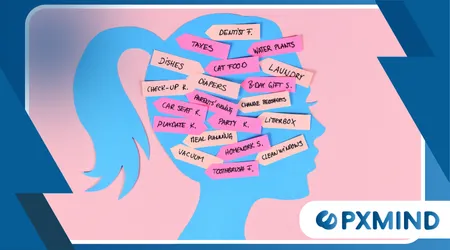How to Beat Mental Fatigue During Long Study Sessions

Beat Mental Fatigue During Long Study Sessions. The modern world bombards us with information, turning our minds into bustling cityscapes.
Anúncios
For students, this mental noise often culminates in a quiet yet devastating opponent: mental fatigue.
It’s that fog that descends, turning brilliant concepts into blurry shapes and making an hour feel like an eternity.
The good news is that this isn’t an insurmountable wall. Instead, it’s a signal from your brain, a plea for a smarter approach.
We can, with the right techniques, not only endure but thrive through even the most demanding study marathons.
Understanding Mental Exhaustion
Mental fatigue is more than just feeling tired. It’s a neurobiological state that impairs cognitive function, reducing our ability to concentrate, make decisions, and process information.
This happens because our prefrontal cortex, the brain’s command center for complex thought, becomes overworked.
Think of your brain like a muscle. When you work out, the muscle eventually fatigues. Our brain works the same way.
We need to train it with the right exercises and give it proper rest to avoid burnout.
The Power of Strategic Breaks
Many people mistakenly believe that the longer they study without a break, the more they will learn. This is a common and damaging myth.
The truth is, strategic breaks are not a sign of weakness; they are a sign of intelligence.
The Pomodoro Technique, a popular time management method, suggests working in focused 25-minute intervals, followed by a short 5-minute break.
After four cycles, you take a longer break of 15 to 30 minutes. This method is incredibly effective at preventing the onset of mental fatigue.
A short walk, listening to a favorite song, or even a few minutes of stretching can do wonders.
Read more: 7 Powerful Mindhacks for Deep Focus
It’s about giving your prefrontal cortex a chance to reset and recharge. It’s like letting the engine cool down on a long drive; it’s necessary to prevent a breakdown.
The Role of Physical Well-Being
Your brain is not an isolated organ; it is deeply connected to your physical health. Neglecting your body is a direct pathway to mental exhaustion.
Proper hydration, for instance, is a simple yet often overlooked factor. Even mild dehydration can impair cognitive function and attention.
A 2019 study published in the journal “Nutrients” found that mild dehydration can lead to significant reductions in mood, concentration, and working memory. So, keep a water bottle handy.
Nutrition also plays a crucial role. A diet rich in whole foods, healthy fats, and antioxidants supports brain health.
Avoid the trap of sugary snacks and energy drinks, which provide a temporary boost followed by a severe crash, further exacerbating mental fatigue. It’s about sustainable energy, not quick fixes.
The Art of Active Learning
Passive learning, such as simply rereading a textbook or listening to a lecture, is not only inefficient but also mentally draining.
Active learning, on the other hand, keeps your brain engaged and alert.
Techniques like summarizing chapters in your own words, teaching a concept to someone else, or creating mind maps force your brain to actively process and synthesize information.
Consider this example: you are trying to understand the principles of quantum mechanics. Instead of just reading about it, try to explain it to a friend who knows nothing about science.
Read here: The Best Time of Day to Learn Effectively
This process will immediately reveal the gaps in your understanding and force you to connect the dots.
This engagement is a powerful antidote to the monotony that leads to exhaustion and helps to Beat Mental Fatigue During Long Study Sessions.

The Importance of Variety
Our brains crave novelty. Monotony is a fast track to boredom and mental exhaustion. To keep your brain engaged, vary your study materials and methods.
If you have been reading for an hour, switch to watching a documentary or solving practice problems. Rotate between different subjects.
For instance, after an hour of history, pivot to mathematics. This cross-training keeps your brain stimulated and prevents any single cognitive pathway from becoming fatigued.
Another effective strategy is to change your study environment.
++ The Neuroscience of Focus and Attention
Moving from a quiet library to a bustling café (if you can handle the noise) or even just a different room in your house can refresh your perspective.
A change of scenery can have a surprising effect on your focus.
The Silent Killer: Multitasking
In our hyper-connected world, multitasking is often hailed as a badge of honor. In reality, it is a productivity killer and a primary cause of mental fatigue.
When you try to do two things at once, your brain is not truly doing both simultaneously. Instead, it is rapidly switching between tasks.
This constant switching takes a huge cognitive toll, leading to reduced efficiency and increased exhaustion.
Think of your brain like a computer with multiple tabs open. The more tabs you have open, the slower the performance and the quicker the battery drains.
Closing unnecessary tabs—like social media notifications or email alerts—allows your brain to dedicate its full processing power to the task at hand.
This focused attention is crucial to Beat Mental Fatigue During Long Study Sessions.
Setting Realistic Goals
We often set ourselves up for failure by setting unrealistic expectations. Planning to study for eight consecutive hours without a break is a recipe for disaster.
Break down your larger goals into smaller, more manageable chunks. Celebrate each small win.
This sense of accomplishment releases dopamine, a neurotransmitter associated with motivation and pleasure, which can help counteract the feelings of fatigue.
For example, instead of “study for the final exam,” set the goal as “read and summarize the first two chapters of the textbook.”
This approach makes the task feel less daunting and keeps you moving forward, preventing the sense of being overwhelmed that often precedes mental exhaustion.
The Ultimate Goal: Sustainable Learning
Ultimately, our goal isn’t just to survive long study sessions but to make learning a sustainable and enjoyable process.
This means being in tune with our body’s signals and our mind’s limitations.
By incorporating these strategies—strategic breaks, physical wellness, active learning, and focused attention—we can transform our approach to studying.
What if the secret to working longer wasn’t about pushing harder, but about taking smarter breaks?
This counterintuitive approach holds the key to unlocking your full cognitive potential and helps you to Beat Mental Fatigue During Long Study Sessions.
It’s about working with your brain, not against it.
By implementing these techniques, you can turn a grueling intellectual marathon into a series of manageable sprints.
This empowers you to not only Beat Mental Fatigue During Long Study Sessions but also to enhance your retention and overall learning experience.
Mastering these skills is not just about academic success; it’s about developing a lifelong approach to high-performance and well-being.
By embracing these principles, you can transform your study habits and achieve more than you thought possible, all while preserving your mental energy.
It’s time to Beat Mental Fatigue During Long Study Sessions and take back control of your learning journey.

Frequently Asked Questions
What is mental fatigue?
Mental fatigue is a state of cognitive exhaustion that happens after a prolonged period of mental effort. It leads to reduced performance and makes it difficult to concentrate.
Why does mental fatigue happen during studying?
It occurs because your brain, especially the prefrontal cortex, becomes overloaded with information processing, much like a muscle gets tired after an intense workout.
What is the best technique to avoid fatigue?
The Pomodoro Technique is one of the most effective methods for maintaining mental energy and concentration. It involves alternating between periods of intense focus and short breaks.
Can diet help?
Yes, your diet directly influences your brain function. Proper hydration and a nutrient-rich diet are essential for sustaining mental effort and preventing energy crashes.
Should I force myself to continue when I feel exhausted?
No. Forcing yourself to study when fatigue sets in is counterproductive. It’s better to take a strategic break to recharge than to continue without being efficient.
++How to Study Long Hours Without Burnout: Proven Strategies
++ Mentally exhausted? Here’s 10 ways to overcome mental fatigue
